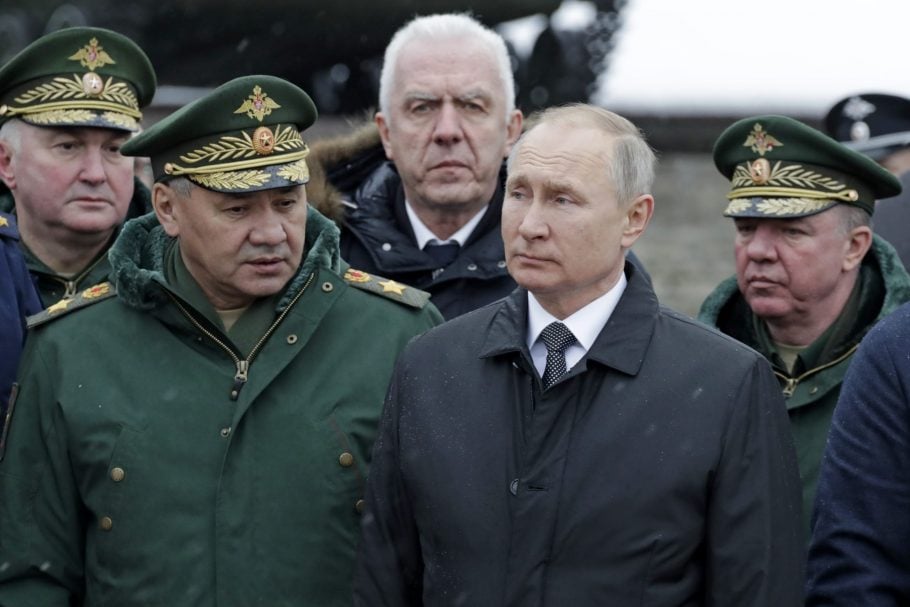
By Kseniya Kirillova, for Byline Times
Kseniya Kirillova explains the influences that make Russians overseas prey to pressure from Vladimir Putin, and how to counteract them.
‘Putin, Bring in Troops!’
The head of a major Russian think tank, the Foundation for the Protection of National Values, last week proposed amending the Russian Constitution to include, in the words of Alexander Malkevich, the right to protect Russians abroad.
In particular, the Foundation wants to supplement Article 61 of the Constitution, guaranteeing protection and patronage to Russian citizens outside the country, with a right to protection.
“The Russian Federation recognises its right to use any force to protect the lives and property of its citizens abroad in cases where the host country cannot or does not want to provide them with the protection to which they are entitled.”
The key phrase is the use of “any force” to protect, not only the life but also the property of, Russian citizens. At the same time, Malkevich does not explain what kind of protection the Russian emigrants are “entitled” to.
Judging by the fact that the reason behind the amendment was the recent arrest of a Russian woman named Olesya Krasilova in Spain at the US’ request and the extradition of a number of Russian hackers to America, it extends to cases of legal prosecution of Russian citizens by authorities of other countries.
The Vulnerability of Russians Overseas: Excommunication
The most alarming thing about the proposal is not only the readiness to use force against other countries under the pretext of protecting Russian citizens, but also that such an initiative is supported by Russian diasporas abroad.
Counterintelligence services of Western countries which try to track the activity of Russian intelligence on their territory often don’t pay enough attention to Moscow’s collaboration with Russians overseas.
While it may be an exaggeration to compare the Kremlin’s diaspora policy to German agents during the Third Reich, Russian President Vladimir Putin’s popularity among Russians living abroad during the 2018 Presidential Election far exceeded his results in Russia. There are various psychological reasons for this.
Many emigrants’ psychological connection with their homeland carries feelings of guilt. The idea that emigration to a “hostile” country (especially to the US or Britain) is a betrayal has been gradually imparted by Russian propaganda until it somehow settled in the subconscious of people, particularly those who do not deliberately embark on the path of dissent. Even after having decided to leave Russia for personal reasons (due to a decline in living standards, the need for self-fulfillment or to provide their children with good education and prospects, for example), such people are completely unprepared to be labelled as “traitors”.
The Kremlin creates numerous associations, forums and congresses of Russian-speaking compatriots who openly declare the goal of re-establishing communication with the “great motherland”. Most of these associations imply support for Putin’s current foreign policy. Many emigrants, even if initially indifferent to politics, are prepared to easily accept this unwritten condition in order to continue to live abroad peacefully and, at the same time, feel that they are “forgiven” by Russia.
For example, during a recent conflict between two different groups in the pro-Russian part of the diaspora in the US, one of the parties threatened the other with a ban on participating in any events held by the Russian consulates and embassy in the US. Even the threat of “excommunication from the embassy” was perceived by these people as the harshest punishment. Having no other ties to their “historical homeland”, these Americans cherished formal contact with the Russian state more than their reputation in their own country.
Longing and Belonging
The second weakness the Kremlin takes advantage of is the need for cultural self-identification among emigrants from Russia. Many organisations which are created or developed with the support of the Russian Foreign Ministry – although formally cultural and educational in nature – are also secretly lobbying on behalf of the Kremlin.
As a rule, 90% of the activities of such organisations are non-political in nature, however, people who delve deeper into their work, sooner or later are forced to face its political aspect.
For example, the Congress of Russian Americans positions itself as the oldest national organisation “rooted in religious Christian Orthodox values”. It is engaged in religious and charitable activity but, at the same time, sends out letters to the US President asking for sanctions to be lifted on Russia.
The main themes of the events by such organisations concern the study of the Russian language and history of the Russian emigration. However, as the organisers themselves point out, there are also messages about “the role the United States played in igniting the colour revolutions around Russia’s perimeter”. Sometimes at these events, conspiracy theories are spread about the “Deep State demonising Russia” and those which openly promote support for Donald Trump.
what the papers don’t say
The third vulnerability actively used by Moscow is the so-called “emigrant crisis”. According to psychologists, almost all emigrants go through a stage of rejection, and sometimes even hatred, towards a new country – including those who now live comfortably in that country.
Under normal conditions, a period of heightened criticism towards a new homeland is temporary and gives way to adaptation. However, the Russian authorities are intensely trying to create a special environment for Russians abroad to ideologically and mentally isolate them from the host country. As a result, the host country –which in a crisis situation is perceived as a source of consolation and comfort – can later become a “psychological trap” that impedes genuine assimilation.
The aim is for the soul of a person who joins a host country to remain attached to his “real” homeland, embodied in immigrant organisations.
How Intelligence Services Use Diasporas
The main goal of Moscow in working with emigrants is to turn “Russian Americans” or “Russian British” into an instrument of soft power, lobbying for Russia’s interests abroad.
At the beginning of November 2018, British media reported that half of the Russian diaspora in the UK are informers for the Russian intelligence services. This sensationalist headline was based on a misinterpretation of a report by Professor Andrew Foxall about the scale of Russian espionage. In fact, citing sources in the intelligence community, the report suggested more modest numbers: about 500 agents led by 200 curators. But Russian émigrés who spoke to Foxall suggested that every second compatriot could potentially turn out to be secretly working for Russia.
Russian authorities have an effective way to pressure emigrants if they have businesses or family in Russia. If a Russian goes home for a visit, FSB officers may ask them questions, which they will not dare to answer. According to the emigrants themselves, up to half of Russians abroad are in such a potential risk zone.
However, recruiting people in this way has certain advantages. Western intelligence agencies cannot track the contacts of Russian intelligence with visitors to Russia so Russians can do their work unnoticed by Western counter-intelligence for a long time. These people are also not on state payroll, so the risk of their exposure by defectors is minimised.
For example, back in October 2013, the FBI accussed a Russian diplomat and head of the Washington-based Russian Cultural Centre, Yury Zaytsev, of recruiting Americans as potential intelligence assets. The FBI alleged that part of Zaytsev’s mission was “sending young professionals from the United States to Russia as part of a cultural programme wherein participants are evaluated and/or assessed for Russian counter-intelligence purposes”.
In 2014, Zaytsev left the US, but his successor in the same post, Oleg Zhiganov, was deported for the same reason at the end of March 2018, as part of the group of 60 Russian diplomats who were accused of espionage.
Another problem is that representatives of the Russian diasporas do not always voluntarily and knowingly agree to work for their former countries. Intelligence services of both countries often use deceit and blackmail in order to obtain information from former fellow citizens.
The renowned Soviet dissident, Boris Perchatkin, claims that he knows of cases where KGB agents infiltrated religious organisations and were then sent abroad, where they received political asylum, ingratiated themselves with real dissidents and even created religious communities. He mentions several goals that the KGB and its successor’s agents pursue when they infiltrate religious organisations in the US.
“Of course, this includes espionage,” Perchatkin says. “Parishioners of Protestant churches are not only elderly people but also youth, students. They get education here, get jobs, for example, at Boeing, and then, at confessions, the pastor gathers the necessary information from them or passes them on to other people.”
How to Help the Diaspora
It is very difficult to determine how many Russians have been involved in cooperating with foreign intelligence at different times, but the most effective form of countering such a threat is prevention: working to remove those psychological vulnerabilities in the diaspora communities.
For Russian emigrants, it is important to encourage the creation of cultural and educational initiatives independent from the Kremlin. The emergence of an “alternative culture” created in Russian, but free from propaganda’s influence, is the greatest fear of Vladimir Putin.
It is important to pay special attention to the Russian-language media existing in the diaspora. The part of the Russian-speaking community that prefers to read the press in their native language often exists in an information vacuum, which creates recruiting opportunities for structures affiliated with the Russian Embassy. It is also important to create programmes which help migrants adapt to a new country or at least help them to deal with urgent problems.
Perhaps no less important is the creation of a special agency where victims of blackmail, threats and other aggressive forms of coercion by other countries can turn. Not all emigrants are ready to deal with counter-intelligence agencies and many do not seek to help the victims, instead only using them for their own purposes and then leaving them to face mortal danger alone.
Emigrants should know that they have somewhere to turn for help, including psychological help, which is no less necessary for people in prolonged stressful situations.
By Kseniya Kirillova, for Byline Times




